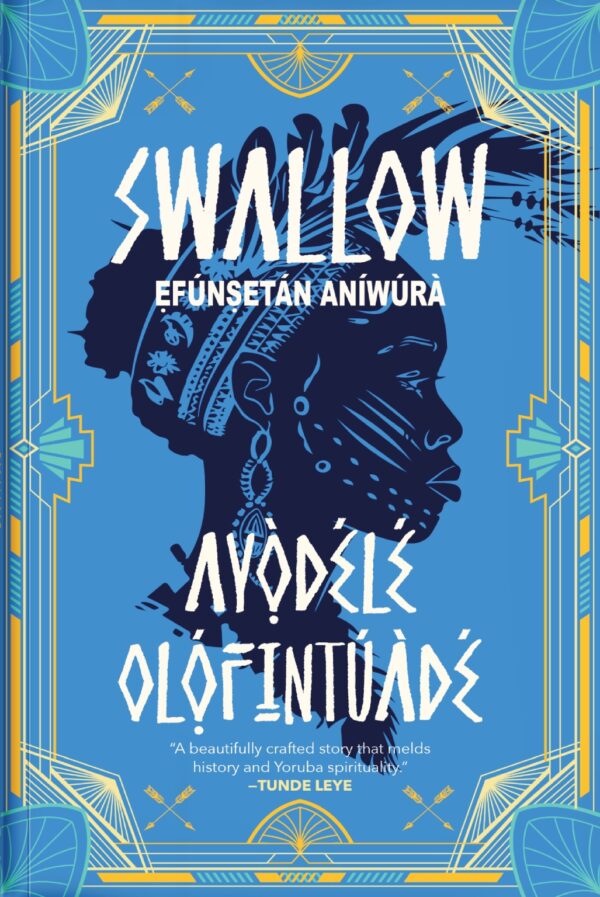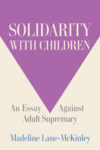This essay was first published last month in our subscriber-only newsletter. To receive the monthly newsletter and to support Full Stop’s original literary criticism, please consider joining us on Patreon.

Our history is in the bodies they tried to straighten, the stories they would not write, the lives they refused to archive.
In Swallow, Efunsetan Aniwura, Ayodele Olofintuade reimagines the life of one of 19th-century Ibadan’s most powerful women, Efunsetan Aniwura, recasting her not as a tyrant or a footnote, but as a woman of fierce will, deep contradictions, and unspoken desires. It’s not just a work of historical fiction; it’s a work of resistance, a striking excavation of queer histories buried under colonialism, patriarchy, and silence. At its heart, Swallow is about who gets to be remembered, and how.
Much of African historical fiction has long been a masculine domain: populated by kings, warriors, and nation-builders. Women, when they appear, are often seen through the lens of reproductive labor, domestic roles, or as symbolic figures. Queer women, if they appear at all, are shadows, outside the realm of normal, outside the archive, outside the respectable past.
Olofintuade, a queer Nigerian feminist and spiritualist, refuses this framework. In Swallow, they center a woman whose legacy has often been reduced to caricature: Efunsetan Aniwura, the second Iyalode of Ibadan, is typically remembered as a ruthless leader who committed suicide after the death of her only child. Yet in Olofintuade’s hands, Efunsetan becomes a site of tension, between myth and memory, between gendered expectations and selfhood, between history and queerness.
What is striking is how Swallow insists on the emotional interiority of its characters, especially women. The novel does not sensationalize queerness or even make it the central subject, it is instead folded into the life of its characters in a way that reflects its invisibilization alongside its quiet resilience. Desire simmers below the surface. Friendship provides cover for intimacy. Loyalty becomes survival. This is queerness, not as spectacle, but as subtext: hidden in plain sight, like so many women’s stories.
But Swallow also reminds us that the silences in our history are not accidental. They are structured absences. Colonial archives, Christianized morality, and the nationalist obsession with unity have all contributed to the erasure of people who lived outside dominant gender and sexual norms. If history has been written with a straight face and a straight line, then Olofintuade writes with curves, sharpness, refusal. They remind us that queerness in African contexts has always existed, even if it was not named, even if it was punished, even if it was rewritten out of the record.
In imagining a fuller, more complex Efunsetan, Swallow invites readers to confront the violence of memory. Who do we remember, and why? What do we do with the women who defy our expectations of femininity, motherhood, obedience, heterosexuality? What does it mean to write them back in, not as tragic exceptions, but as part of the fabric of who we are?
The novel also draws from Yorùbá spiritual frameworks, offering an alternative to Western binaries of gender and sexuality. Here, femininity is not fragility. Authority is not inherently male. The gods themselves are fluid, unpredictable, and nonconforming. In invoking these traditions, Olofintuade pushes back not only against the violence of colonial record-keeping but also against the narrowness of imported moral frameworks.
Reading Swallow today is a reminder that literature can do what history often cannot: restore the dignity of the forgotten, complicate the stories we’ve inherited, and speak the names of those once buried in shame. It is an urgent gesture because queer women, particularly in African societies, are still being erased, both in the public and the intimate. They are still living under the burden of illegibility.
Olofintuade gives us a different kind of legacy. One where memory is not about perfection but possibility. One where women like Efunsetan do not have to be palatable to be worthy of record. One where queerness, despite all odds, endures.
This isn’t just a literary concern, it’s a political one. When we recover stories like Swallow, we open space for future queer African narratives to exist, with less fear. In doing so, we affirm what has always been true: that queer people, queer women, queer Africans, have always been here. We were just not always allowed to be seen.
Azeezah Adekanmbi is a writer, researcher, and a final-year student of Archaeology and Anthropology at the University of Ibadan. Her work moves across archives, heritage, queerness, and memory, often tracing how lives and histories are represented, and misrepresented, through cultural forms. Beyond academia, she runs a fashion brand rooted in accessibility and self-expression, and curates conversations on film and literature.
This post may contain affiliate links.






